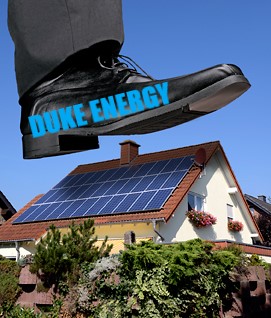NC WARN, allies to challenge deal they say would limit rooftop solar to the affluent and lock in constant rate hikes for a massive expansion of climate-busting gas-fired power
Today, NC WARN vowed to mount a legal and grassroots challenge to an upcoming Duke Energy plan for North Carolina that would greatly alter rooftop solar rules and, the group says, stifle the growing solar market while amplifying the global climate crisis. The Durham-based climate justice watchdog says the scheme is part of a decade-long national effort by Duke, the Kochs and other polluters to choke the growth of renewable power, which is now cheaper than dirty energy.
Last fall, Duke Energy announced a South Carolina settlement reached quietly with several parties that would revamp the rooftop solar industry if state regulators approve. They intend to bring the same program to North Carolina to replace current “net metering” rules, where solar customers are compensated for excess power they feed onto the grid.
 NC WARN and its consulting engineer Bill Powers, a veteran opponent of US utility efforts to suppress solar, have analyzed the deal and discussed it with settling parties and their consultant.
NC WARN and its consulting engineer Bill Powers, a veteran opponent of US utility efforts to suppress solar, have analyzed the deal and discussed it with settling parties and their consultant.
Powers and NC WARN say the deal would harm North Carolina in multiple ways, including doubling today’s flat monthly fee to $30 for homes adding solar, a particular barrier for those on low and fixed incomes, and setting 6-9 pm – when little or no solar power is produced – as the period when homes get the most credit for power they feed onto the grid.
Above all, NC WARN says, limiting the growth of solar enhances Duke’s plan to build more than 50 fracked-gas-burning power units at an unknown number of Carolinas sites, along with the constant rate hikes and worsening climate impacts that would accompany the expansion of methane gas.
Jim Warren, executive director of NC WARN, said today, “Despite years of Duke Energy hampering solar power, the rooftop market finally began to grow. So, Duke responds by maneuvering to stifle that growth – even as more North Carolinians are being devastated by weather extremes and when the world’s top scientists demand we replace fossil fuels with renewables.”
Bobby Jones, head of the Down East Coal Ash and Environmental Justice Coalition, today vowed to help build opposition to what he called Duke’s oppressive solar plan. “We’ve had enough of Duke Energy’s injustices,” Jones said. “We’re calling for a just system where solar power can equitably benefit all North Carolinians. We’re tired of communities of color and low incomes getting nothing from Duke Energy but its coal ash and dirty power generation.”
Warren explained that, although renewable power is now cheaper than fossil fuels, receiving a fair price for excess kilowatt-hours fed onto the grid by rooftop systems is important, as are the monthly fees. Presently, net metering rules are straightforward, crediting solar homes for their excess power at the same rate they pay when buying power from Duke Energy. Duke then sells the excess power to the solar customers’ neighbors, which reduces Duke’s justification to build gas-burning power plants.
The new scheme would require solar homes to switch to a complicated “time-of-use” billing in which they would pay and be credited different amounts for different times of day, and the highest credit would occur when minimal solar power is being generated.
One reason Duke claims these changes are necessary is to prevent non-solar customers from subsidizing those with rooftop solar. However, NC WARN found that the consultant for parties in the South Carolina settlement testified only weeks later in a separate case that there is no such cost shift under South Carolina’s current rules.
This “solar hurts the poor” message has been promoted by utilities and fossil fuel interests, including a national campaign targeting Black leaders. In 2015, Greensboro’s Rev. Nelson Johnson co-authored, with Warren, a letter to Duke Energy CEO Lynn Good citing utility efforts to distance Johnson from those promoting solar power.* Johnson, a civil rights leader with the Beloved Community Center, admonished the CEO for Duke’s role in that campaign, which has been discredited by the national NAACP and others.
Ironically, the key weapons used to slow solar growth across the U.S. have been fees such as the $30 per month minimum bill Duke proposes in the Carolinas, which impact lower-income families the most. Utilities in other states are already citing Duke’s “Carolinas plan” to bolster their case to add such fees.
NC WARN said it’s announcing the challenge now because the South Carolina settlement – which regulators could approve by spring – requires the settling parties to advocate for the same deal in NC. Warren said Duke is likely lining up endorsements here already, before any public announcement, thus before nonprofits and others even hear that clean energy experts oppose the rule changes.
NC WARN Organizing Director Connie Leeper said today, “We’re urging nonprofits across the state to reject Duke Energy’s undercutting of rooftop solar. Instead, we’re calling for ’solar for all’ through a system-wide approach where all power users share the benefits of solar-plus-storage that’s financed through the statewide system. That plan was detailed by Bill Powers in 2017 in his NC Clean Path 2025 strategy developed for NC WARN. That’s the way to avoid ever-growing power bills and climate chaos.”
* See the opinion piece summarizing the letter; also Jonathan Scott’s 2020 documentary, “Power Trip” and NC WARN’s “Duke Hates Solar” web page.
Ask your nonprofit to support this effort by signing on here





